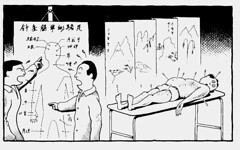Enter the Sham Acupuncture
Despite a lack of scientific support, acupuncture is used in the treatment of depression, allergies, asthma, arthritis, smoking, migraines and so on.
It's a quack treatment that seems to be accepted by a fairly large number of otherwise rational people.
The general attitude is that as long as an explanatory model "works" it is irrelevant to criticize it and ask Does acupuncture really work?. The "good" advice is that it works and if you're good you won't be ill.
Some common claims about acupuncture are:
Needles were stuck in my ear and after that I quit smoking
Acupuncture may not help smokers kick the habit
Comments: The conclusion from the study is that acupuncture works by expectation of the patient and the the physical distraction of actually placing the needles in the body. There may be more effective methods to quit smoking.
After two months of acupuncture treatments I became pregnant (Acupuncture for fertility: Doctors say, "Why not"?)
Comment: People are spending thousands of dollars for getting pregnant by using acupuncture and that’s a dilemma because it’s an unproven treatment. As acupuncture is considered relatively safe doctors are deciding that it's OK to add it to the mix. If you become pregnant or not it's just the placebo effect, who cares?
This Study sticks a pin into the effectiveness of acupuncture therapy, the original research is to be found at JAMA (Acupuncture for Patients With Migraine ):
A new research finds the ancient remedy offers no greater pain relief than sham treatments.This study suggests that the locations of where the needles are placed on the body may not be relevant but rather the act of needling itself confers benefit compared to no treatment.
Acupuncture proved no more effective than sham treatments for pain from a common chronic condition, according to a new study.
...
The study concluded that adding acupuncture to other treatments the patients were already using provided no greater pain relief than sham acupuncture treatments, according to the Tuesday issue of Annals of Internal Medicine.
...
In the study, patients in all the groups improved, but very early, after only one or two treatments — far earlier than most acupuncturists would expect an improvement — and then remained at the same level for the rest of the study, Buchwald said.
Inserting needles at the "wrong" places has been tested before and with the same result: It has the same effect as inserting the needles at the "right" places.
This says that acupuncture theory is wrong.
In another recent study researchers said they have separated out the placebo effect. Acupuncture "more than a placebo" was published in the BBC News 30. April 2005:
The researchers used positron emission tomography (PET) scans to see what was happening in the brains of people having acupuncture treatment for arthritis pain.I don’t know what the PET changes represent, but I think this must be of importance:
……Professor Henry McQuay, professor of pain relief at the University of Oxford and member of the Bandolier group that looks at the evidence behind different medical treatments, said: "The great bulk of the randomised controlled trials to date do not provide convincing evidence of pain relief over placebo.
"Some people do report that acupuncture makes them feel better.
"But it is extremely difficult, technically, to study acupuncture and
tease out the placebo effect."
Were patients asked whether they thought, they were having sham or "real" acupuncture? (i.e. was the study effectively blinded?)
Were the needles thrust deeply enough to stimulate the nerve system and affect parts of the brain?
How do we know that the brain area was not activated just because of the practitioner's belief in the treatment?
How long did the effects last?
Is it a temporary effect on pain or on the brain that are of little clinical relevance?
Well, -now I am lead to the conclusion that it doesn't matter if the needles are inserted at the "meridian" points or simply placed at random. Benefits gained from acupuncture are merely down to a person's expectation that the treatment will work and it's deeply affected by the the placebo effect.
And acupuncturists is not just sticking needles into people as most people think when they say it "works".
Those who practice acupuncture claim they are unblocking chi and helping to balance yin and yang and this is a process that cannot be measured empirically.
By the above reason you couldn't say whether acupuncture "works" or not ( - if -acupuncture by accident turn out to be an effective medical tool by stimulating the release of endorphins or by taking advantage of the Mysterious Placebo Effect).
As long as acupuncturists claim that it only works at specific meridian points, then acupuncture remains health fraud.
Surprise Finding on Acupuncture for Migraine
Acupuncture treatment no more effective than sham treatment in reducing migraine headaches
The Skeptic's View: Acupuncture
Acupuncture Watch










<< Home